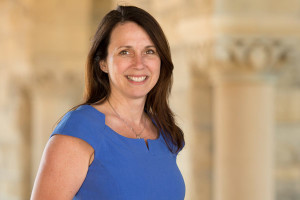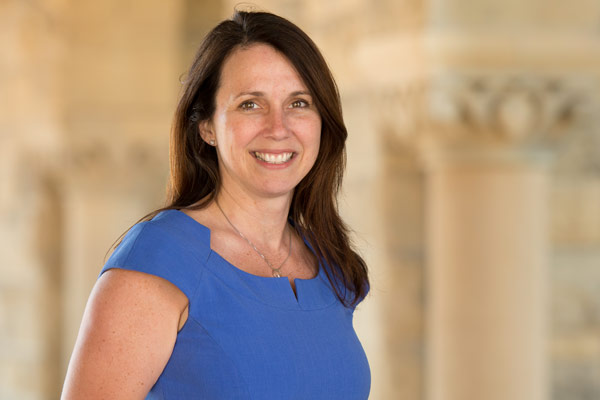
Catherine Criswell Spear, Stanford’s first Title IX coordinator, will step down from her post on Sept. 11. A former director of the Department of Education’s Office of Civil Rights (OCR) in Cleveland, she will be moving to the University of Virginia (UVA) as the new assistant vice president for equal opportunity programs.
“UVA recruited me to fill a new Assistant Vice President of Equal Opportunity Programs position at their university,” Spear wrote in an email to The Daily. “I will not only have the opportunity to continue to do Title IX work, but also to be involved in overseeing other areas of civil rights and equal opportunity law compliance involving students, faculty and staff. In addition to being a wonderful professional opportunity, on a personal level, this opportunity also allows my husband and me to live closer to family in a more affordable location.”
Spear’s tenure at Stanford coincided with a period of increased interest in and criticism of the way universities around the country handle sexual assault cases.
Soon after her appointment in May 2014, Stanford saw the national debate take center stage at home when Leah Francis ’14 challenged the approach taken by the University in handling her case of an off-campus sexual assault, an investigation that occurred before Spear’s tenure. Hundreds of students rallied behind Francis in protest, with the hashtag #StandWithLeah going viral.
In response, the University convened the Provost’s Task Force on Sexual Assault last June, on which Spear served. The Task Force issued its recommendations this April, among which was the adoption of expulsion as the default sanction for sexual assault and the creation of a new investigation process to replace the Alternative Review Process (ARP). Currently, the ARP serves as the Office of Community Standards’ method for handling cases related to sexual assault, sexual harassment, dating violence and stalking.
“A clear Title IX investigation and resolution process that is clearly and consistently communicated is critical to building student and community trust in the process,” Spear said.
“The Provost’s Task Force on Sexual Assault and the committee’s recommendations embody this principle and, once implemented, will only serve to enhance this important aspect of the University’s Title IX efforts,” she added. “However, building trust in a new process will take time.”
Stanford remained in the spotlight for much of her tenure, as an investigation into sexual harassment at Sigma Alpha Epsilon, resulting in the loss of their house, was followed by the arrest of freshman swimmer Brock Turner for attempted rape and allegations that Palantir cofounder Joe Lonsdale ’04 sexually assaulted his former girlfriend, a former Stanford student.
As Stanford’s Title IX Coordinator, Spear was responsible for investigating many of the incidents and deciding appropriate sanctions. Her office came under criticism from members of the Stanford community for its handling of confidentiality issues, including for the travel ban placed on the Leland Stanford Junior University Marching Band after the University found it guilty of violating policies on alcohol, controlled substances, sexual harassment and hazing.
Spear noted that the Title IX office is placed in a unique, often divisive space when it comes to issues on campus and sometimes has to take a particular course of action due to federal law. One of the major challenges, she said, was to create clarity around the role of the Title IX office and the overlapping responsibilities it shares with other offices like the SARA Office, the Office of Community Standards and the Sexual Harassment Policy Office.
“Often what people disagree with is legally required by the Title IX federal law and OCR,” Spear said. “For example, universities are required to use the preponderance of the evidence (more likely than not) legal standard in deciding these matters, and they cannot simply refer a matter to law enforcement and do nothing.”
“Another challenge is that federal privacy law (e.g. FERPA) prohibits the University from correcting inaccurate or incomplete information in media reports,” she added.
However, Spear noted that as outreach and education continues about the role of Title IX, challenges related to understanding the function of the office and its jurisdiction will diminish over time.
“Stanford is grateful for the considerable contributions Catherine made to Stanford over the past year and a half, including expanding the Title IX office and her participation on the Provost’s Task Force on Sexual Assault Policies and Practices.” said Lisa Lapin, University spokeswoman. “We wish her well as she returns to be closer to her family on the East coast.”
Contact Arnav Mariwala at arnavm ‘at’ stanford.edu.
